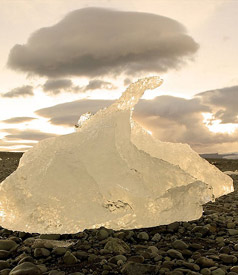
|  |  |  Editorials | November 2009 Editorials | November 2009  
Purloined E-mails Don't Change the Facts
 Eugene Robinson - Washington Post Eugene Robinson - Washington Post
go to original
November 27, 2009


| | Melting ice in the Arctic. (nick_russill) |  |
Washington - Stop hyperventilating, all you climate change deniers. The purloined e-mail correspondence published by skeptics last week - portraying some leading climate researchers as petty, vindictive and tremendously eager to make their data fit accepted theories - does not prove that global warming is a fraud.

If I'm wrong, somebody ought to tell the polar ice caps that they're free to stop melting.

That said, the e-mail episode is more than a major embarrassment for the scientists involved. Most Americans are convinced that climate change is real - a necessary prerequisite for the kinds of huge economic and behavioral adjustments we would have to make to begin seriously limiting carbon emissions. But consensus on the nature and scope of the problem will dissipate, and fast, if experts try to obscure the fact that there's much about the climate they still don't know.

Here's what happened: Someone hacked into the servers at one of the leading academic centers in the field - the Climatic Research Unit of the University of East Anglia in Norwich, England - and filched a trove of e-mails and documents, which have been posted on numerous Web sites maintained by climate skeptics.

Phil Jones, the head of the Climatic Research Unit, released a statement Wednesday saying, "My colleagues and I accept that some of the published e-mails do not read well." That would be an example of British understatement.

In one message sent to a long list of colleagues, Jones speaks of having completed a "trick" with recent temperature data to "hide the decline." The word "trick" is hardly a smoking gun - scientists use it to refer to clever but perfectly legitimate ways of handling data. But the "hide the decline" part refers to a real issue among climate researchers called the "divergence problem."

To plot temperatures going back hundreds or thousands of years - long before anyone was taking measurements - you need a set of data that can serve as an accurate proxy. The width of tree rings correlates well with observed temperature readings, and extrapolating that correlation into the past yields the familiar "hockey stick" graph - fairly level temperatures for eons, followed by a sharp incline beginning around 1900. This is attributed to human activity, primarily the burning of fossil fuels and the resulting increase in heat-trapping atmospheric carbon dioxide.

But beginning around 1960, tree-ring data diverges from observed temperatures. Skeptics say this calls into question whether tree-ring data is valid for earlier periods on the flat portion of the hockey stick - say, 500 or 1,000 years ago. Jones and others acknowledge they don't know what the divergence means, but they point to actual temperatures: It's warmer now than it was 100 years ago.

Another e-mail - from Kevin Trenberth of the National Center for Atmospheric Research in Boulder, Colo. - is even more heartening to the skeptics. Trenberth wrote last month of the unusually cool autumn that Colorado was experiencing, and went on: "The fact is that we can't account for the lack of warming at the moment and it is a travesty that we can't."

He appears to be conceding skeptics' claim that over the past decade there has been no observed warming. In truth, though, that wouldn't be much of a concession. At issue is the long-term trend, and one would expect anomalous blips from time to time.

From my reading, the most damning e-mails are those in which scientists seem to be trying to squelch dissent from climate change orthodoxy - threatening to withhold papers from journals if they publish the work of naysayers, vowing to keep skeptical research out of the official U.N.-sponsored report on climate change.

In his statement, Jones noted that the e-mail hack occurred just days before the climate summit in Copenhagen. "This may be a concerted attempt to put a question mark over the science of climate change," he said. There's that understatement again.

The fact is that climate science is fiendishly hard because of the enormous number of variables that interact in ways no one fully understands. Scientists should welcome contrarian views from respected colleagues, not try to squelch them. They should admit what they don't know.

It would be great if this were all a big misunderstanding. But we know carbon dioxide is a greenhouse gas, and we know the planet is hotter than it was a century ago. The skeptics might have convinced each other, but so far they haven't gotten through to the vanishing polar ice. |

 |
|  |



